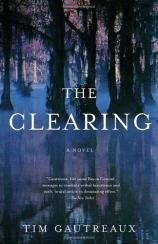The Clearing
Review
The Clearing
If you're looking to fell a cypress tree five feet in diameter, or if you need to incapacitate a man using a shovel, or if you need to pull half of a nightclub into a river using a steamboat, you'll find clear, step-by-step instructions in Tim Gautreaux's second novel, THE CLEARING. Although he certainly doesn't condone such actions, Gautreaux describes them so evocatively and in such detail that you almost suspect he is writing from firsthand experience. He has obviously researched the hell out of this novel, yet, to his credit, those long hours of study never show through in these passages. Instead, these darkly riveting descriptions attest to his storyteller's eye for process, historical verisimilitude, and specific setting.
It is also to Gautreaux's credit that these acts of brutality against nature and against humans all have grave costs. The violence he describes in THE CLEARING, albeit gruesome, is never gratuitous, but always instructive, and the alternation between action and consequence propels the plot in a flurry of suspense.
The story concerns Randolph Aldridge, a Pennsylvania Yankee who comes to the Nimbus lumber mill in remote Poachum, Louisiana, with dual purposes: to make the mill profitable again and to persuade his runaway brother, Byron, to return to the family in Pittsburgh. The former is easy, since the swampland surrounding Nimbus is rich with virgin cypress wood, but the latter is difficult unto impossible.
A veteran of World War I, Byron acts as the mill's constable, breaking up bar fights and scaring off alligators. But his propensity for quick, authoritative violence is unsettling. He has absorbed the horrors of the battlefield and the brutality of the lawless logging camp, and the moral burden has made him remote and hardhearted: "Byron's life was a motionless thing. Most people drifted and reshaped like clouds throughout their lives, pushed along by poverty or wealth, disaster or luck. Byron was a self-contained vessel of sorrow that needed to be broken open."
The novel persistently addresses the peculiar morality of violence through the actions of both Aldridge brothers. When a brawl erupts in the mill saloon, Byron stops it by shooting a man dead, claiming that by doing so he had saved the lives of the others who would have been killed. "You know, the angel of death is still an angel," he tells Randolph coldly. Or, as the parish marshal, a wiry, white-haired octogenarian named Merville, remarks, "It's a sin to kill, but what if I don't kill one, and that one kills two or three? Did I kill that two or three?"
As the Aldridge brothers escalate a bloody feud with a Sicilian mobster named Buzetti, the question of whether or not violence is justified if it prevents further violence echoes throughout the novel like a rifle report. Gautreaux knowingly shades the dilemma with hard intricacies, suggesting that violence takes a psychological as well as a physical toll on all those involved.
Without pushing an ecological or an anti-violence agenda, Gautreaux clearly equates the killing of human beings with the clearing of the cypress forest, and he recognizes the murky morality of each act. In THE CLEARING, many men are killed so that others may lead productive lives, both for the mill and for society in general. Likewise, the trees they cut and ship are, despite the barren landscape they leave behind, an economic necessity, eventually used to build homes, barns, churches, and businesses across the country and to provide comfort and shelter. Ultimately, the uncomfortable implications of this code haunt the novel: "We all guilty, and everybody got a death sentence," observes Merville.
Gautreaux describes the felling of men and trees with unflinching precision, but more importantly, he demonstrates by example how to write an expertly plotted, genuinely engrossing, and acutely affecting story about the ways in which violence strips the human heart.
Reviewed by Stephen M. Deusner on January 21, 2011
The Clearing
- Publication Date: May 11, 2004
- Genres: Fiction
- Paperback: 336 pages
- Publisher: Vintage
- ISBN-10: 1400030536
- ISBN-13: 9781400030538





